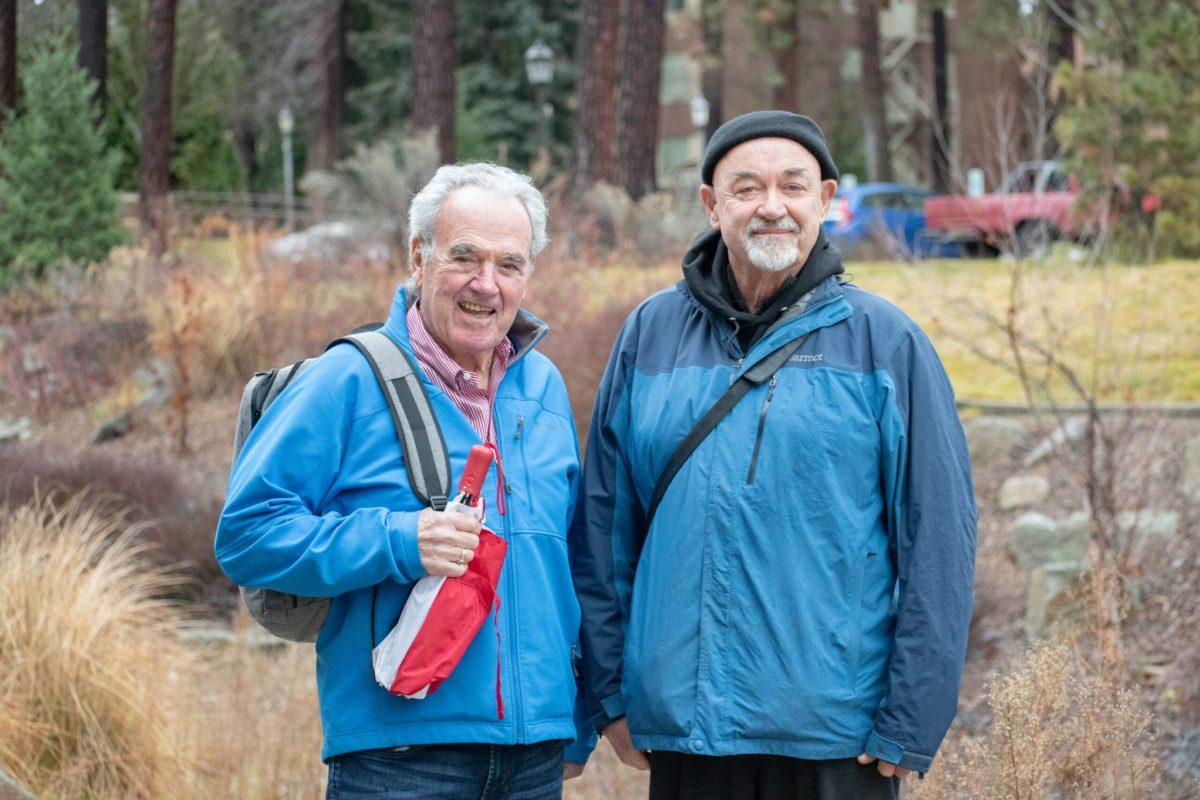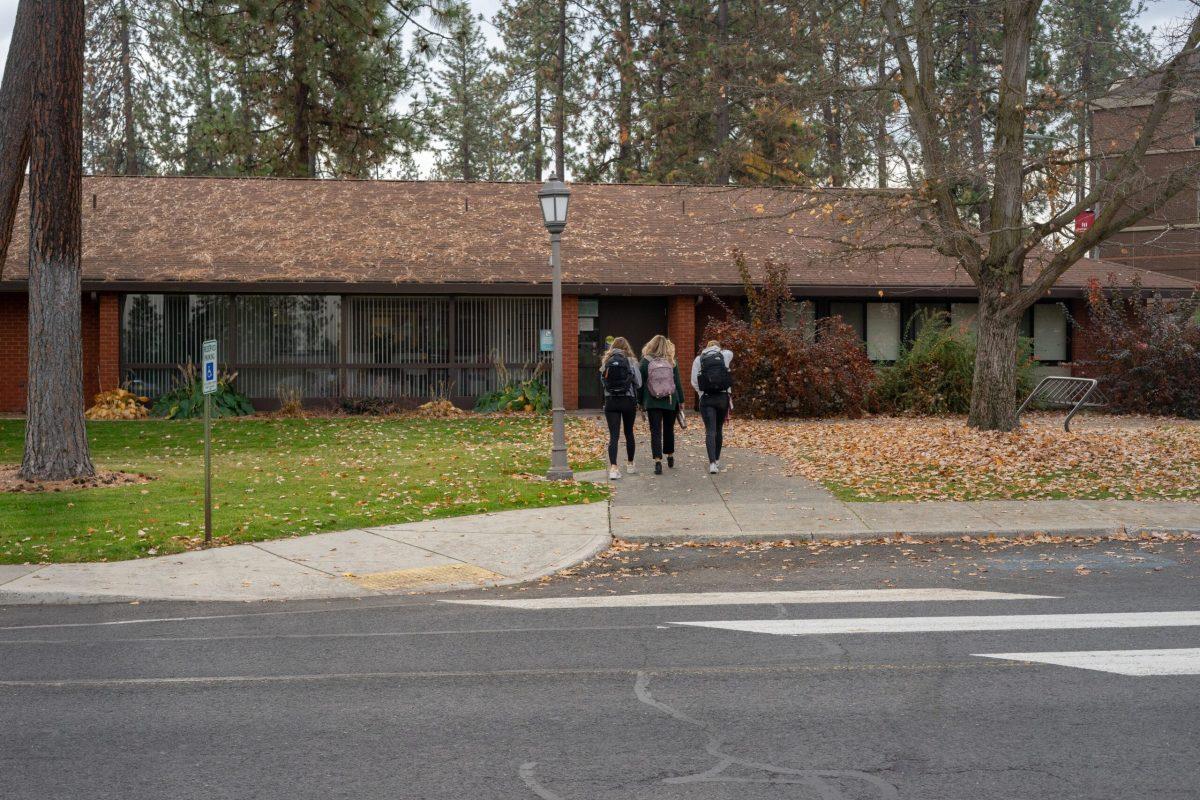By Isaac Price | Staff Writer & Emma Maple | Editor-in-Chief

On April 19, over forty campus members crowded into the Associated Students of Whitworth University (ASWU) chambers in the HUB. They gathered to express their viewpoints on ASWU’s April 12 decision to reject Turning Point USA (TPUSA)’s request to bring Xi Van Fleet, who survived Mao’s cultural revolution, to campus as a club speaker. The meeting had standing room only and extra security had been requested by ASWU.
Following brief club updates and general business items, ASWU Vice President Christian Aguilar handed the floor to TPUSA treasurer Vanessa Flowers, who had requested to open the discussion with a brief prayer.
Aguilar opened the floor for discussion, and ten hands immediately sprang up.
TPUSA speaker is denied in ASWU meeting
The week prior on April 12, ASWU had voted to decline TPUSA’s request for Van Fleet as a speaker. Nine members voted against the proposal, four voted in favor and two members abstained. *
This vote occurred after a discussion regarding concerns about bringing Van Fleet to campus. Those in favor of bringing Van Fleet to campus discussed the idea of desiring a voice for the conservative community and allowing free speech and civil discourse.
Some of the concerns about bringing Van Fleet included the content of her tweets. Many of the tweets compare what Van Fleet calls “woke culture” to her experiences within Mao’s cultural revolution. ASWU members said their constituents were concerned with the analogies she made and what sort of precedent allowing this sort of rhetoric would set for future speakers, as well as the impact her rhetoric could have on certain campus communities, especially the LGBTQ+ community.
Grace Stiger, president of TPUSA and Off-Campus Senator for ASWU, responded directly to concerns about Van Fleet’s potentially homophobic comments by saying “Whitworth and ASWU doesn’t stand for homophobia and neither do I.”
Stiger went on to say that the sole reason for Van Fleet’s proposed visit to campus was so Van Fleet could discuss her lived experiences as a survivor of Mao’s cultural revolution. Stiger did not want Van Fleet on campus to talk about homophobia.
“I’ve made my expectations to her very clear. If anything along those lines does come up, we will take action needed,” Stiger said at the April 12 ASWU meeting.
Despite this, the proposal to bring Van Fleet to campus was denied.
Many of the ASWU members who voted against bringing Van Fleet to campus did so due to concerns their constituents had brought up regarding Van Fleet’s views.
Niraj Pandey, international student senator, said, “Her posts and Twitter feed are so aligned with this, kind of, rhetoric of hate…and I think a lot of my constituents felt that.”
Off Campus Representative Nick Yochum cited similar concerns. “I had about 13 constituents that brought it up to me [the idea of Van Fleet coming to campus] and were very concerned…and were very clear about why…Out of the constituents I spoke to, I don’t have anybody that specifically thought that we should vote yes.”
Club coordinator Jamie Gassman, ‘24, gave a “general reminder” during the meeting in which he said that ASWU voting members were responsible to represent their constituents and “not bring someone that is harmful and make sure students feel safe.” He went on to say that “civil discourse is also needed and important…”
Yochum, Pandey and other ASWU members voted against Van Fleet coming to campus in order to represent their constituents.
“We did what we were supposed to do…” Pandey said. “I don’t think anybody [in ASWU] did anything because of their own political statements or sentiments.”
Pandey said that if he would have voted in favor of Van Fleet coming to campus if he could vote based on personal opinion, so that he could have a “discussion or debate” with her. However, because the constituents he represents expressed a desire that the speaker be rejected, Pandey voted against bringing her to campus.
After the meeting, ASWU President Georgia Goff provided Stiger with alternative methods of getting the speaker to talk with the TPUSA club.
Goff informed Stiger that a speaker can be brought in through any academic department, without approval of the ASWU assembly, as long as the department Provides approval for the speaker. Goff said this route is the most effective alternative under limited time.
In the past, according to Goff, other clubs whose proposed events or speakers were denied have also been informed of this alternative option.
“I wanted to make sure everybody had an equal understanding of that option,” Goff said.
TPUSA leadership did not pursue approval for Xi van Fleet through any academic department. TPUSA Vice President Mazie Castagnetta, ‘24, said this was because they didn’t know of any department where they were “comfortable” enough with the professors to ask them to sponsor the event.
Another alternative is to move the event off campus in an informal, unsponsored setting.
Goff said, “If one individual from the club spreads [a previously denied event] among their friends by word of mouth, that’s not a club event and we can’t do anything about that.”
TPUSA leadership ultimately decided to pursue this second option and re-invited Van Fleet to speak on April 27 in an off-campus setting.
Students express opinions over ASWU decision at next meeting
TPUSA still expressed dissatisfaction with the ASWU vote. An Instagram post by the Pride Club included screenshots of an email Stiger sent to TPUSA after the April 12 meeting. Part of the email read, “ASWU voted against TPUSA bringing Xi Van Fleet…due to her conservative views.”
Goff’s written explanation on why the TPUSA speaker was rejected, prepared in anticipation for the April 19 meeting, said that the reason ASWU members rejected the vote was due to the fear of inviting someone to campus who “perpetuated unsafe and harmful ideals for certain community members.”
Goff said that even in the rejection, ASWU still upheld Whitworth’s Commitment to Free Expression and Civil Discourse, which states in part, “We exhort one another to tame the tongues’ power to do harm…[and] Whitworth aims to ready graduates to express themselves in ways that affirm the life, dignity and image of God reflected in each person.”
Many of the ASWU members felt that Van Fleet had a history of “poking fun” at the lifestyles of LGBTQ+ individuals and was therefore not adhering to those statements, according to Goff.
“If we are going to value civil discourse, we want the discourse to be civil and we don’t feel that that’s what she promotes,” Goff said.
Stiger’s email to the TPUSA club went on to say that “This is your time as a conservative at Whitworth to let your voice be heard.” It invited students to attend the ASWU meeting on April 19 and express why students “struggle as a conservative at Whitworth.”
Once the Pride Club was informed that TPUSA members would be expressing their views at the April 19 ASWU meeting, they encouraged Pride Club members and anyone who was interested to “be there to rebuttal…”
Pride Club President Bryan Acevedo-Prado said in an interview, “If you want to have a discussion, you have to have both sides of the party. You can’t just have one side.”
On April 19, after the first two speakers shared their viewpoints, the room voted to allow each speaker two minutes in the interest of time.
Some students expressed disapproval at ASWU’s rejection of Van Fleet, wanting a conservative viewpoint to be represented and citing the values of free speech and civil discourse.
“I felt that ASWU wasn’t fulfilling the obligations that they say they do, representing students, interviewing constituents, not falling in with bias, and [things] like that,” TPUSA-affiliated student August Albers, ‘23, said in an interview.
“Xi Van Fleet has a place to share her story…it’s an optional event, we’re not forcing people to go, and I feel like everyone has a right to bring whoever they want to campus,” Castagnetta said in an interview.
Other students approved of ASWU’s decision and discussed the appreciation that Van Fleet would not be invited on campus.
“This wasn’t about censorship; this wasn’t about limiting the free exchange of academic ideas…” Pride club-affiliated student Alex Vickers, ‘23, said in an interview. “I think that in order to have an exchange of ideas happen and people learn and grow from different experiences, we need to have a basis of all students feeling welcome to the table, and all students feeling safe in general.”
“If this speaker was approved, this would set a precedent for speakers holding the view that the identities of queer people, people of color and trans people . . . can be seen as a political talking point. . . . Those groups aren’t politically affiliated; those are just people’s identities,” Vickers said.
During the open floor discussion, several students used their speaking time to discuss the views of the LGBTQ+ community in relationship to the Christian faith.
Senior Hannah Sommerville, off campus representative, said the meeting “got really quickly derailed from what, in theory, people were there [for]. It very quickly turned from talking about the speaker, to just being homophobic.”
Though tensions rose during the meeting, the end of the meeting saw some individuals reverse their viewpoints on bringing Van Fleet to campus. As the third to last speaker, Castagnetta apologized. “To see all the hurt that this potential speaker caused to other people . . . broke my heart,” Castagnetta said in an interview.
She said that attempting to bring Van Fleet might have been a mistake. Stiger, as second to last speaker, agreed and called the speaker proposal “probably not the best idea.”
The ASWU meeting ended just before 7pm, but the conversation did not end there. Students with varying different opinions loitered outside the meeting room, discussing what went on.
Junior Willow Vaugn, vice president of Pride Club, was optimistic about how the ASWU meeting went. “We made some connections tonight that I think both sides are really happy to have,” they said.
As next year’s TPUSA president, Castagnetta said her “biggest goal next year” is to foster a culture of togetherness, respect and unity between people or camps that may not align.
Outside reactions occur
The rejection of Van Fleet has gained media coverage from several media outlets including Fox News, Campus Reform and many more.
Stiger told Campus Reform that TPUSA often requests to bring speakers to campus and that TPUSA “receives way more questions and opposing votes than any other club.”
TPUSA was chartered in October of 2022 and has only requested one other speaker, Andrew Greene, to come to campus. When the club requested Greene in March of 2023, ASWU minutes reflect that the request garnered no questions. The speaker was approved by ASWU with 14 in favor, zero opposed and zero abstaining.
At the end of the April 19 ASWU meeting, Goff announced that TPUSA could petition to reverse Van Fleet’s rejection if they wanted to.
The ASWU Constitution, Article X, Sections 2 and 3 outline four processes for assembly members to overturn a vote that proves dissatisfying to some of the campus population.
Three of these processes require a petition with at least 10 percent of the student body as signatories. With around 1800 students currently enrolled, according to Goff, a viable petition would need at least 180 student body signatures. These three options include an assembly member exercising 1) the power of initiative, which means presenting the completed petition to the ASWU president that is then sent to the entire student body for a vote; 2) the power of referendum, which takes the completed petition to just the ASWU assembly for a vote; 3) the power of recall, which also takes the completed petition to the student body for a vote.
A fourth option is if an ASWU member brings forward a statement of opinion in the form of a resolution, which then would require an approval vote by two-thirds of the ASWU assembly to pass.
Goff stated that, to her knowledge, there has been no move from TPUSA leadership, one of whom currently serves in ASWU, to pursue any of these four options. TPUSA declined to pursue the petition process because of limited time, according to Castagnetta.
ASWU’s decision has also garnered attention from a legal organization. On April 17, The Foundation for Individual Rights in Expression (FIRE), which is focused on defending freedom of speech, wrote a letter to Whitworth requesting that they reverse their decision in line with “Whitworth’s Statement on Freedom of Expression and Civil Discourse for Our Campus Community.” FIRE requested a response to the letter by April 24 either reversing the decision to reject Van Fleet or identifying that the rejection had not been due to Van Fleet’s viewpoints, which would be in violation of Whitworth’s commitment to the “Constitutional understanding of free expression.”
As of April 24, no letter has been sent in response to FIRE’s request, as far as The Whitworthian is aware.
*Isaac Price, one of the writers of this article and a Resident Assistant in Baldwin-Jenkins (BJ), attended this ASWU meeting on April 12 in proxy of Sierra Witte, ‘26, BJ Senator, a voting member of ASWU. Price abstained from voting on TPUSA’s speaker proposal due to lack of information regarding Van Fleet’s viewpoints and due to not wanting to represent Witte’s vote.












 Spokane?
Spokane?
Carol Bryan • Apr 29, 2023 at 3:43 pm
how can i as a whitworth alum sign thr petition protecting rights of lgbtq…. community at Whitworth?